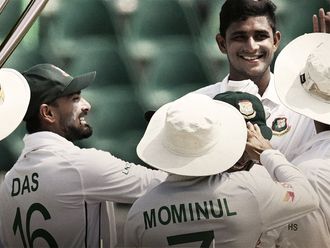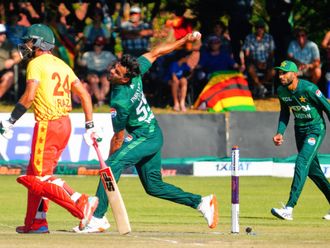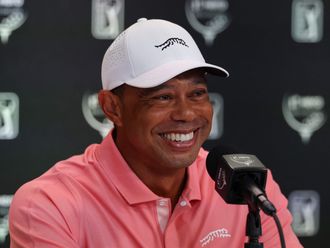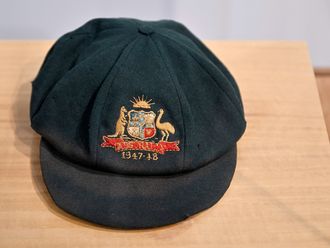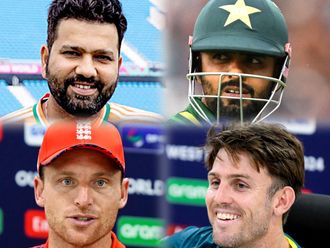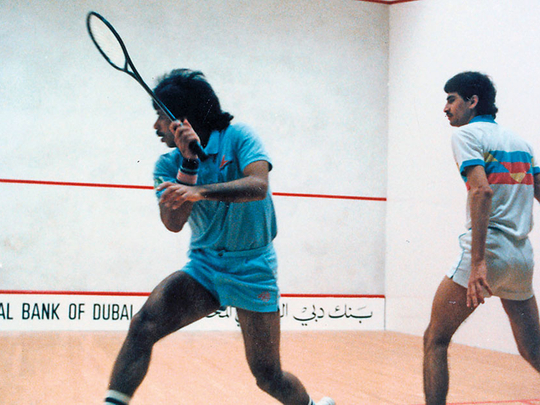
Dubai: If Pakistan squash players today put in half the effort of their predecessors the country would get back to the top, according to record 10-time British Open champion Jahangir Khan.
Pakistan once dominated the sport through Hashim Khan and Azam Khan in the 1950s-1960s and then Jahangir Khan and Jansher Khan in the 1980s-1990s.
The country still boasts 30 British Open wins, more than any other nation, with Jahangir himself picking up a record 10 of those titles in a row from 1982 to 1991.
The British Open was seen as the de-facto world championship before the creation of the World Open in 1976 and even in that more recent tournament Pakistan still hold the most wins with 14, six of which also came from Jahangir with five in a row from 1981 to 1985, the other being in 1988.
Despite that rich history, a Pakistani player hasn’t even reached the final, let alone won a tournament in 20 years.
What happened? “The problem these days is youngsters feel they can play on talent alone and don’t want to work hard with determination and discipline,” said Jahangir, who was in Dubai for the Professional Squash Association (PSA) World Series Finals at Dubai Opera this week.
“They believe that with talent they can win, but I believe you need to put the hours in as well. If they started doing even half of what we did, they could come up to the top level, but they are looking for shortcuts.
“The opportunities and facilities they have are far better than in our time and if they only started showing results they could do more than what we used to do, the problem is they are not doing the same as what we did. I only wish I had this time now as I could have done it all again.”
Jahangir, who still holds the record for the longest winning streak in sport — not just squash — with 555 wins in a row from 1981 to 1986, also conceded that the lack of big tournaments coming to Pakistan — due to safety fears — was an issue.
“This is another reason our boys are suffering because they don’t have international events or exposure and that makes a difference. If you have all the academies and junior programmes but can’t have any events there, it sets everything back. But we hope that changes in the near future. We’d love to have big tournaments like we used to.”
Asked if anyone would break his records, he replied: “These days you don’t see maintained unbeaten runs for longer than three to six months, the World No.1 doesn’t hold that position for long, so it won’t be easy. My records have already lasted 30 years, so you never know.”
He said it wasn’t a case of the game being more competitive today, however.
“There were good names around back then as well. I wasn’t just playing alone, I had to earn it.
“Players today need more commitment and determination to break records. I wasn’t meant for it I just played every game like a final and realised after going through matches that I had won 555 over five years. You can’t aim for something like that.”
The game had changed since his time though, he conceded. “With the nine points [only server scores] scoring system, matches were more mental and physical and could go longer, but now with the 11-point [point a rally] system, every rally counts, and even if you go behind you can still recover. That makes it a lot more attacking.”
This he said would make the game more appealing for eventual Olympic consideration. “There are more interesting matches, TV coverage has improved and we’re going to better venues. In our day it was difficult to watch on TV, but they’ve made a lot of changes and I’m sure we’ll get into the Olympics soon.
“It’s unfair that we aren’t already in the Olympics, we have 185 member nations, a circuit that goes all around the world, and 25 to 30 million playing every day. As a player I always felt we should be there. We fulfil every requirement, so they have to change their minds, we are not in the 1950s anymore, it’s the 21st century.”






